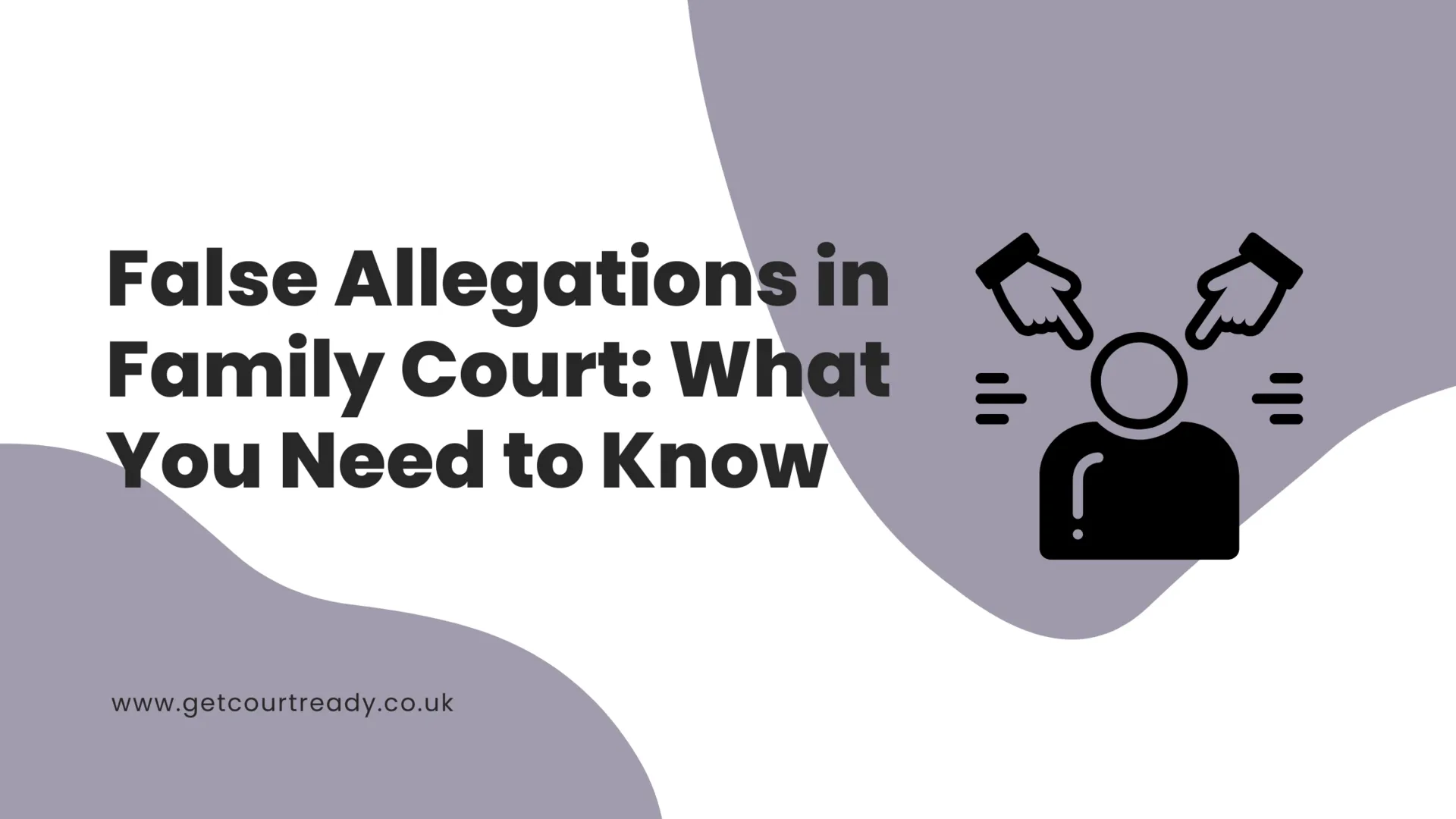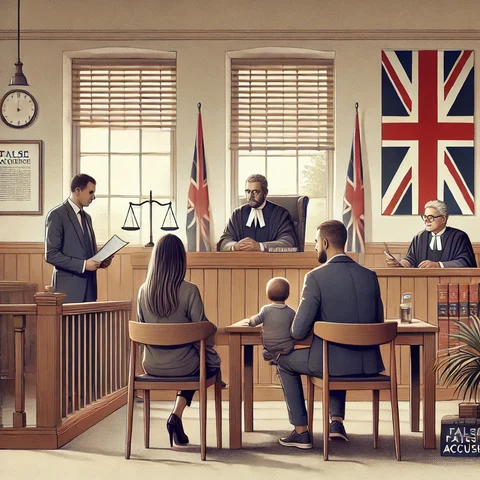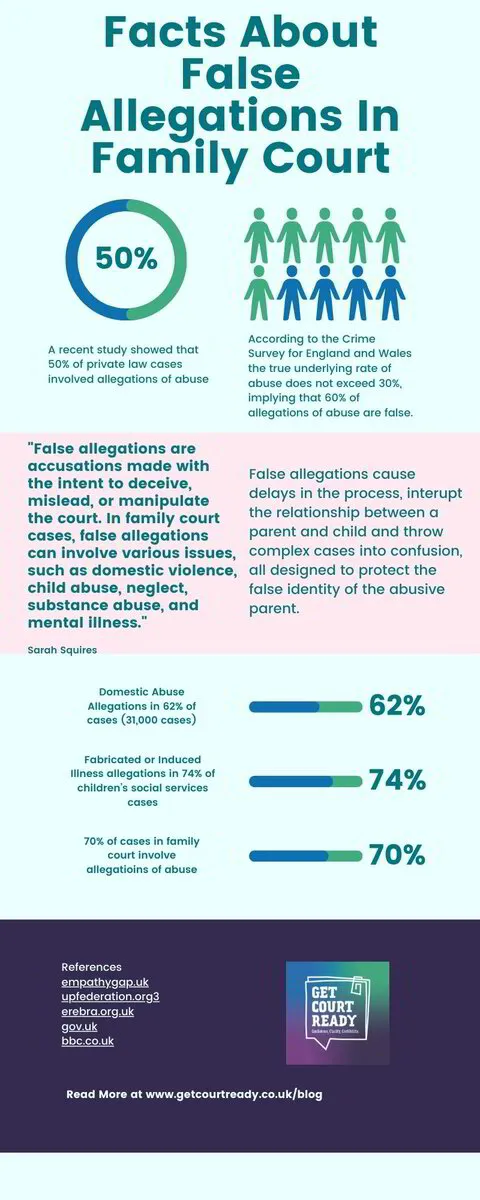Family court cases can be stressful and emotional, especially when they involve children. Sometimes, one parent may resort to making false allegations against the other parent, hoping to gain an advantage in custody or financial disputes. These allegations can range from domestic violence, child abuse, substance abuse, mental illness, or even sexual abuse.
False allegations can have devastating consequences for both the accused parent and the child. The accused parent may face criminal charges, lose their parental rights, or suffer damage to their reputation and career. The child may experience trauma, confusion, or alienation from the other parent. Statistics regarding false allegations in family court in the UK reveal a complex landscape. Research indicates that approximately 56% to 60% of allegations of domestic abuse made in private law cases are false.
In this blog post, we will explore the following topics:
- How, why, and when false allegations are made
- How false allegations are dealt with (or not) in family court
- How to protect yourself in the short and long term
False allegations are accusations made with the intent to deceive, mislead, or manipulate the court. In family court cases, false allegations can involve various issues, such as domestic violence, child abuse, neglect, substance abuse, and mental illness.
For more about false allegations, read our blog False Allegations and the Family Court System in the UK
Gender Differences
In my work with victims I have found some subtle gender differences as to the types of allegations made against mothers and fathers.
Fathers
Some types of false allegations that are made against fathers are:
- Sexual Abuse: Some mothers may falsely accuse fathers of sexually abusing the children, in order to prevent them from having contact or influence. They may use medical or psychological reports, or coach the children to make false statements, to support their claims.
- Domestic Violence: Some mothers may falsely accuse fathers of being violent or abusive towards them or the children, in order to gain sympathy, custody, or financial benefits. They may fabricate evidence, such as injuries, photos, or witnesses, to support their claims.
- Substance Abuse: Some mothers may falsely accuse fathers of abusing drugs or alcohol, in order to cast doubt on their mental health, judgement, or stability. They may use drug tests, police reports, or social media posts to imply that the fathers are addicted or impaired.
- Mental Illness: Some mothers may falsely accuse fathers of suffering from mental illness, such as depression, anxiety, bipolar disorder, or personality disorder, in order to question their competence, reliability, or sanity. They may use psychiatric evaluations, prescriptions, or hospitalisations to suggest that the fathers are unstable or dangerous.
- Parental Alienation: Some mothers may falsely accuse fathers of alienating the children from them, in order to portray them as unfit or harmful parents. They may claim that the fathers have brainwashed, manipulated, or coerced the children to reject or fear them. Equally they might say that claims of alienation made by the father are in fact attempts to further abuse the mother and children.
Mothers
Some types of false allegations that are made against mothers are:
- Domestic Violence: Some fathers may falsely accuse mothers of being violent or abusive towards them or the children, in order to gain sympathy, custody, or financial benefits. They may fabricate evidence, such as injuries, photos, or witnesses, to support their claims.
- Child Abuse: Some fathers may falsely accuse mothers of physically, emotionally, or sexually abusing the children, in order to alienate them from the mothers, or to prevent them from having contact or influence. They may coach the children to make false statements, or use medical or psychological reports to back up their allegations.
- Neglect: Some fathers may falsely accuse mothers of neglecting the children, in order to portray them as unfit or irresponsible parents. They may exaggerate or invent incidents, such as leaving the children alone, failing to provide adequate food, clothing, or medical care, or exposing them to harmful environments or substances.
- Substance Abuse: Some fathers may falsely accuse mothers of abusing drugs or alcohol, in order to cast doubt on their mental health, judgement, or stability. They may use drug tests, police reports, or social media posts to imply that the mothers are addicted or impaired.
- Mental Illness: Some fathers may falsely accuse mothers of suffering from mental illness, such as depression, anxiety, bipolar disorder, or personality disorder, in order to question their competence, reliability, or sanity. They may use psychiatric evaluations, prescriptions, or hospitalisations to suggest that the mothers are unstable or dangerous.
- Parental Alienation: Some fathers may falsely accuse mothers of alienating the children against him, even when significant findings of coercive control, domestic abuse and child abuse have been made.
But why?
False allegations serve a number of purposes for an abusive ex.
How, Why, and When False Allegations are Made
There is no definitive answer to why some parents make false allegations against the other parent. However, some possible reasons are:
- Anger and Revenge: Some parents may harbour resentment or hostility towards the other parent, and seek to hurt them or ruin their lives.
- Fear and Anxiety: Some parents may fear losing their child or their relationship with them, and try to prevent the other parent from having contact or influence.
- Control and Power: Some parents may want to dominate or manipulate the other parent, and use false allegations as a weapon or a bargaining tool.
- Mental Health Issues: Some parents may suffer from mental health issues, such as personality disorders, paranoia, or delusions, and genuinely believe their false allegations.
- Coaching and Influence: Some parents may be influenced or coached by others, such as family members, friends, lawyers, or even the child, to make false allegations.
In cases I work on, false allegations are a silver bullet for narcissists, serving many purposes including allowing them to play both hero and victim, whilst ensuring the ex is labelled as abusive. This fits with their false sense of self as always being right, lacking awareness of their own actions and needing to win at all costs. It also muddies the waters for professionals and creates a “smoke and mirrors” environment where the narcissist diverts suspicion away from themselves and onto someone else. This allows them to behave abusively under the noses of everyone who is busy investigating the other parent. They also utilise the children in this strategy to give their narrative more weight with sympathetic bystanders and ultimately to punish their ex to the extreme.
False allegations can be made at any stage of the family court process, but they are more likely to occur during high-conflict situations, such as:
- Separation or Divorce: When parents decide to end their relationship, they may face disputes over custody, property, finances, or other issues. False allegations may be used to gain leverage or sabotage the other parent’s case.
- Custody or Visitation Changes: When parents seek to modify or enforce their existing custody or visitation arrangements, they may encounter resistance or conflict from the other parent. False allegations may be used to block or limit the other parent’s access or involvement with the child.
- New Partners or Relationships: When parents start new relationships or introduce new partners to their child, they may trigger jealousy or insecurity in the other parent. False allegations may be used to interfere or disrupt the new relationship or the child’s adjustment.
How False Allegations are Dealt with (or not) in Family Court
Family court judges have a duty to protect the best interests of the child, and to ensure that both parents have a fair and impartial hearing. However, dealing with false allegations can be challenging and complex, as they often involve conflicting evidence, testimonies, and emotions.
Depending on the nature and severity of the allegations, the family court may take different actions, such as:
- Ordering an Investigation: The family court may order an investigation by a social worker, a child protection agency, a police officer, or a forensic expert, to gather more information and evidence about the allegations. The investigation may involve interviews, observations, assessments, or tests, of the parents, the child, or other witnesses.
- Appointing a Guardian ad Litem: The family court may appoint a guardian ad litem, a neutral person who represents the child’s interests and welfare. The guardian ad litem may conduct their own investigation, interview the parties, review the records, and make recommendations to the court.
- Ordering a Custody Evaluation: The family court may order a custody evaluation, a comprehensive evaluation of the parents, the child, and their relationship, by a qualified mental health professional. The custody evaluator may use various methods, such as interviews, observations, psychological tests, or home visits, to assess the parenting abilities, the child’s needs, and the impact of the allegations.
- Ordering Supervised Visitation or No Contact: The family court may order supervised visitation or no contact between the accused parent and the child, until the allegations are resolved or disproved. Supervised visitation means that the accused parent can only see the child in the presence of a third party, such as a relative, a friend, or a professional. No contact means that the accused parent cannot see, talk to, or communicate with the child at all.
- Ordering Mediation or Counselling: The family court may order mediation or counselling for the parents, the child, or both, to help them resolve their conflicts, improve their communication, and address the underlying issues that led to the false allegations. Mediation or counselling may be voluntary or mandatory, and may be conducted by a mediator, a counsellor, or a therapist.
Unfortunately, not all false allegations are dealt with effectively or promptly in family court. Some of the challenges or barriers are:
- Lack of Resources: Family courts may lack the resources, such as staff, time, or funding, to conduct thorough and timely investigations, evaluations, or interventions. This may result in delays, errors, or omissions, that affect the outcome of the case.
- Lack of Training: Family court judges, lawyers, or other professionals may lack the training, knowledge, or experience, to handle false allegations, especially when they involve complex or sensitive issues, such as child abuse or sexual abuse. This may result in biases, misunderstandings, or misjudgments, that affect the credibility or reliability of the evidence or the testimony.
- Lack of Standards: Family courts may lack clear and consistent standards, guidelines, or protocols, to deal with false allegations, especially when they vary from jurisdiction to jurisdiction, or from case to case. This may result in inconsistencies, discrepancies, or contradictions, that affect the fairness or impartiality of the process or the decision.
How to Protect Yourself in the Short and Long Term
If you are facing false allegations in family court, you may feel overwhelmed, frustrated, or helpless. However, there are some steps you can take to protect yourself and your child, both in the short and long term, such as:
- Hire a Lawyer: The first and most important step is to hire a lawyer who specialises in family law and has experience in dealing with false allegations. A lawyer can advise you on your rights, options, and strategies, and represent you in court. A lawyer can also help you gather evidence, prepare documents, and cross-examine witnesses, to support your case and refute the allegations.
- Keep Records: The second and most crucial step is to keep records of everything related to the allegations, such as:
- Communication: Keep copies of all communication between you and the other parent, the child, or any other parties involved, such as emails, texts, letters, or voicemails. Also, keep a log of all phone calls, visits, or interactions, with dates, times, locations, and details.
- Evidence: Keep copies of all evidence that can prove your innocence or disprove the allegations, such as photos, videos, receipts, bank statements, medical records, school records, or police reports. Also, keep a list of all potential witnesses who can corroborate your story or contradict the allegations, with names, contact information, and statements.
- Events: Keep a diary or a journal of all events related to the allegations, such as when they were made, how they were reported, what actions were taken, or what outcomes were achieved. Also, keep track of your emotions, thoughts, or feelings, as they may affect your mental health or your behaviour.
- Follow Court Orders: The third and most vital step is to follow all court orders, even if you disagree with them or find them unfair. This includes complying with any investigations, evaluations, or interventions, and respecting any supervised visitation or no contact orders.
- Failing to follow court orders may result in legal consequences, such as contempt of court, fines, or jail time. It may also damage your reputation, credibility, or relationship with the court, the child, or the other parent.
- Be Prepared: Narcissists in particular are highly predictable and will employ their own malicious strategy which, if you can get out ahead of it, can be curtailed and undermined early on in the process. Get Court Ready can help with this by giving you the tools to develop a specialist strategy designed to outwit a narcissistic ex.
- Seek Support: The fourth and most beneficial step is to seek support from others who can help you cope with the stress, anxiety, or anger, caused by the false allegations. This includes seeking professional help from a counsellor, a therapist, or a support group, who can provide you with emotional, psychological, or practical support. It also includes seeking personal help from family, friends, or community, who can provide you with moral, social, or financial support.
- Stay Positive: The fifth and most hopeful step is to stay positive and optimistic, even when the situation seems hopeless or endless. Remember that you are not alone, and that there are many people who care about you and your child. Remember that you are not guilty, and that the truth will eventually come out. Remember that you are not powerless, and that you can take action to protect yourself and your child.
False allegations in family court are a serious and complex problem that can affect anyone. However, by following these steps, you can increase your chances of overcoming them and achieving a positive outcome for yourself and your child.
Conclusion
In conclusion, navigating the complexities of family court can be a daunting task, especially when faced with false allegations. Understanding the motives behind these allegations, the role of domestic abuse and narcissists, and the impact of parental alienation is crucial. This blog aims to shed light on these issues, providing you with the knowledge and tools to protect yourself both in the short and long term. Remember, knowledge is power, and being well-informed is your best defence in the family court system. Stay strong, stay informed, and know that you are not alone in this journey.
Fighting False Allegations?
Grab Your Free 22 Page Factsheet
we will not send spam or sell your information



